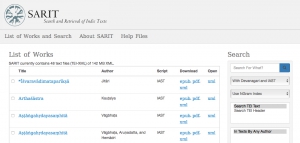“New” Sanskrit Term Search Program
In case you did not see this post on H-Buddhism Net, or do not have access to that listserv, here’s the news:
I am pleased to announce a new service that is now available through the INDOLOGY website.
 SARIT is a freely-available online facility that enables you to search through an online library of Sanskrit texts for keywords, word-collocations, and other linguistic strings. The system is based on the well-known ARTFL software, and is exceptionally powerful. It can handle many forms of query and output, including KWIC indexes. Your imagination is the limit.
SARIT is a freely-available online facility that enables you to search through an online library of Sanskrit texts for keywords, word-collocations, and other linguistic strings. The system is based on the well-known ARTFL software, and is exceptionally powerful. It can handle many forms of query and output, including KWIC indexes. Your imagination is the limit.
The texts are presented on screen using standard scholarly roman transliteration (Unicode), and searches can be constructed in transliteration or in a plain ASCII equivalent.
As of today the SARIT library includes the full texts of the Manavadharmasastra and the Arthasastra. We expect the library to expand in the future as funding, time, and expertise allow.
SARIT is available here:
The SARIT service has been discussed and planned by myself and Richard Mahoney, and implemented by Richard. Financial support for part of the work has been received from the British Association for South Asian Studies (www.basas.org.uk), to whom we are most grateful.
Enjoy,
Dominik Wujastyk
This SARIT library is still being built but should prove to be an excellent resource. When searching for terms, remember to use the utf-8 characters. The easiest way to do this, depending on what computer you are using, may be to simply copy and paste the example letters on the search page listed under “Enter search terms with utf-8 characters“. You can also paste characters using “Show Character Palette” if you are on a MAC; however, not every character is present in that list, such as the ṁ or ṣ.
If you are having trouble with the search options, here are some more tips from Richard Mahoney:
Instead of pasting in the utf-8 characters you can use postfix modifiers instead:
Here is a list of the postfix modifiers available for Romanised Skt (really just Harvard-Kyoto without the uppercase):
long a (ā) = a;
long i (ī) = i;
long u (ū) = u;
vocalic r (ṛ) = r;
vocalic l (ḷ) = l;
velar n (ṅ) = g;
palatal n (ñ) = j;
retroflex t (ṭ) = t;
retroflex d (ḍ) = d;
retroflex n (ṇ) = n;
palatal s (ś) = z;
retroflex s (ṣ) = s;
anusvara (ṁ) = m;
visarga (ḥ) = h;
circumflex = ^ :: e.g., a^ –> â
Using these modifiers you could search for `kauṭilīya’ (kauTilIya) by entering either of the following in the search field:
i.) kauṭilīya (utf-8)
Here is the search result: http://tinyurl.com/dmgupa
ii.) kaut;ili;ya (postfix modifiers)
Here is the search result: http://tinyurl.com/cnkmu9
Also, you might find these pages helpful:
Alan Wood
Unicode and Multilingual Programs and Utilities: http://www.alanwood.net/unicode/utilities.html
For Mac OSX:
Robert Zydenbos
Using Unicode fonts with Mac OSX: http://www.lrz-muenchen.de/~zydenbos/unicodeosx.html
